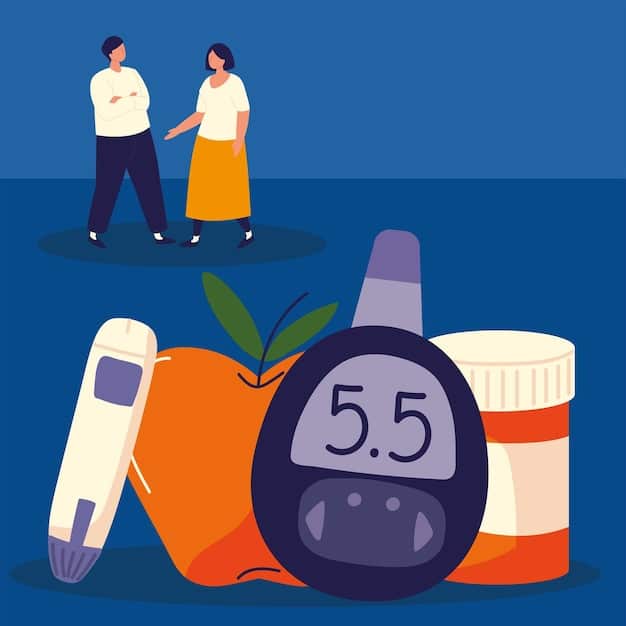Diabetes and ED Link: Prevention & Treatment Insights

The intricate relationship between diabetes and erectile dysfunction (ED) is well-established, with chronic high blood sugar damaging nerves and blood vessels essential for erections, necessitating a comprehensive understanding of both prevention and treatment strategies for men’s sexual health.
Living with diabetes presents various health challenges, and one often overlooked yet significant concern for many men is its profound impact on sexual health, particularly the connection between diabetes and erectile dysfunction: prevention and treatment. This exploration delves into this complex relationship, offering clarity and practical insights.
Understanding the Core Connection between Diabetes and ED
The link between diabetes and erectile dysfunction (ED) is a critical area of men’s health, often discussed but not always fully understood. Diabetes, particularly type 2, significantly increases the risk of developing ED. This is not a coincidence but rather a direct consequence of how high blood sugar impacts the body over time.
Chronic elevated glucose levels can lead to damage in several key physiological systems essential for achieving and maintaining an erection. These include the vascular and nervous systems, which are crucial for the complex processes involved in sexual function.
The Role of Vascular Damage
One of the primary mechanisms linking diabetes to ED is vasculopathy, or damage to blood vessels. When blood sugar levels remain high, it can lead to thickening and narrowing of the blood vessels (atherosclerosis). This process impedes healthy blood flow throughout the body, including to the penis.
- The penile arteries need to expand to allow sufficient blood flow for an erection.
- Damaged arteries may struggle to dilate effectively, restricting the necessary blood intake.
- Reduced blood flow means a man might have difficulty getting an erection or maintaining it long enough for sexual activity.
This vascular impairment is a gradual process, often developing over years of poorly controlled diabetes. It highlights the importance of early diagnosis and rigorous management of blood glucose levels to protect cardiovascular health throughout the body, including the delicate vessels involved in erectile function.
The Impact on Nerve Function (Neuropathy)
Diabetic neuropathy, or nerve damage, is another significant contributor to ED in men with diabetes. High blood sugar can harm the nerves responsible for transmitting signals between the brain and the penis.
- Autonomic nerves control involuntary bodily functions, including the relaxation of penile smooth muscle for blood engorgement.
- Somatic nerves transmit sensation and are involved in the physical stimulation leading to an erection.
- Damage to these nerves can disrupt the intricate signaling pathway required for a healthy erection response.
The severity of neuropathy often correlates with the duration and control of diabetes. Men may experience diminished sensation, leading to difficulties in arousal, or impaired nerve signals preventing the erectile tissues from responding properly to sexual stimulation.
In essence, the prolonged exposure to high glucose levels creates a hostile internal environment that erodes the structural and functional integrity of the circulatory and nervous systems, both indispensable for healthy erectile function. Recognizing these underlying physiological changes is the first step in understanding why diabetes so frequently leads to ED and how crucial comprehensive management becomes.
Early Signs and Symptoms: Recognizing the Problem
For men with diabetes, recognizing the early signs and symptoms of erectile dysfunction is crucial for timely intervention and better management. ED often develops gradually, and what might seem like occasional difficulty can be an early indicator of a more persistent issue.
It’s important to differentiate between temporary challenges and consistent patterns. Sexual performance can fluctuate for various reasons, but a recurring problem warrants attention, especially in the context of diabetes.
Subtle Changes in Erectile Function
The onset of ED is not always sudden. Often, it begins with subtle changes that men might initially dismiss or attribute to stress or fatigue. These can include:
- Reduced frequency or firmness of erections.
- Difficulty maintaining an erection throughout sexual activity.
- A decrease in spontaneous morning erections.
- Less intense orgasms or reduced ejaculation volume.
Observing these changes, even if minor, is an important step. They serve as signals that the underlying health condition, in this case, diabetes, might be beginning to impact a man’s erectile health. Open communication with a healthcare provider about these observations can lead to earlier diagnosis and management.
Psychological and Emotional Impact
Beyond the physical symptoms, the psychological and emotional toll of ED can be significant. Feelings of frustration, embarrassment, anxiety, and even depression are common responses. These emotional factors can, in turn, worsen the physical problem, creating a self-perpetuating cycle.
Anxiety about sexual performance can lead to a phenomenon known as performance anxiety, where the fear of not being able to achieve an erection itself becomes a barrier. This can complicate diagnosis, as psychological factors can intertwine with physiological ones.
When to Seek Medical Attention
Any consistent difficulty with erectile function, especially if you have diabetes, should prompt a visit to a healthcare professional. Early diagnosis allows for a more effective treatment plan and can also indicate the general health of your cardiovascular and nervous systems given the systemic nature of diabetes-related complications.
Doctors can conduct a thorough evaluation, which may include reviewing your medical history, a physical examination, and blood tests to assess blood sugar control, hormone levels, and overall cardiovascular health. It’s vital to be honest and open about all symptoms, regardless of how minor they might seem. A proactive approach to these early signs can make a considerable difference in managing both diabetes and its associated ED.
Prevention Strategies: Taking Control of Your Health
Preventing erectile dysfunction in men with diabetes revolves primarily around diligent management of the underlying condition. Lifestyle modifications and strict adherence to medical advice are paramount in preserving not only general health but also sexual function.
While prevention isn’t always absolute, these strategies significantly reduce the risk and severity of ED by mitigating the vascular and neurological damage inherent to uncontrolled diabetes.

Optimal Blood Sugar Control
This is arguably the most critical aspect of prevention. Maintaining blood glucose levels within the target range significantly slows down or prevents the progression of complications that lead to ED. Regular monitoring, proper medication, and dietary discipline are key components.
- Regular monitoring of HbA1c levels, which reflect average blood sugar over 2-3 months.
- Adherence to prescribed diabetes medications, whether oral agents or insulin.
- Working closely with a healthcare team to adjust treatment plans as needed to achieve optimal glycemic control.
Consistency in managing blood sugar is more important than occasional strictness. It’s the long-term cumulative effect of high glucose that does the most damage.
Embracing a Healthy Lifestyle
Beyond blood sugar control, a holistic approach to health contributes significantly to ED prevention. These lifestyle factors indirectly protect the vascular and nervous systems.
- Balanced Diet: Focus on whole, unprocessed foods, lean proteins, and healthy fats. Limit refined carbohydrates, sugary drinks, and unhealthy fats. A diet rich in fruits, vegetables, and fiber supports overall metabolic health.
- Regular Physical Activity: Engage in at least 150 minutes of moderate-intensity aerobic exercise per week, complemented by strength training. Exercise improves insulin sensitivity, cardiovascular health, and blood flow.
- Weight Management: Losing excess weight, especially around the abdomen, can improve insulin sensitivity and reduce the risk of cardiovascular complications, thereby lessening the risk of ED.
- Quit Smoking and Limit Alcohol: Smoking severely constricts blood vessels and damages their lining, accelerating atherosclerosis. Excessive alcohol consumption can also impair erectile function both acutely and chronically.
These lifestyle changes not only help manage diabetes but also promote overall cardiovascular health, which is intrinsically linked to erectile function. They reinforce the body’s natural defenses against the damage caused by high glucose.
Stress Management and Mental Well-being
Chronic stress can significantly impact both diabetes management and sexual health. High stress levels can raise blood sugar and contribute to psychological ED. Incorporating stress-reducing practices is beneficial.
Mindfulness, meditation, yoga, or engaging in hobbies can help manage stress. Addressing any underlying psychological issues, such as depression or anxiety, through therapy or counseling can also play a vital role. By taking proactive steps to manage diabetes effectively and adopting a comprehensive healthy lifestyle, men can significantly reduce their risk of developing or worsening diabetes-related ED, safeguarding their sexual health as an integral part of their overall well-being.
Treatment Options for Diabetes-Related ED
When prevention efforts are insufficient or ED has already developed, a range of treatment options is available for men with diabetes. The choice of treatment often depends on the severity of ED, the man’s overall health, and his personal preferences.
A comprehensive approach usually involves addressing both the underlying diabetes and the specific symptoms of ED, often in consultation with a urologist or endocrinologist.
Oral Medications: PDE5 Inhibitors
Phosphodiesterase-5 (PDE5) inhibitors are the most common first-line treatment for ED, including in men with diabetes. These medications work by increasing blood flow to the penis.
- Examples include sildenafil (Viagra), tadalafil (Cialis), vardenafil (Levitra), and avanafil (Stendra).
- They function by relaxing smooth muscles and enhancing the effects of nitric oxide, which helps dilate blood vessels.
- While generally effective, they require sexual stimulation to work and are not suitable for everyone, especially those taking nitrates for heart conditions.
It’s crucial to discuss your full medical history with your doctor to ensure these medications are safe for you. Dosage and timing also play a significant role in their effectiveness.
Other Medical Interventions
When oral medications are ineffective or contraindicated, other medical treatments can be considered:
- Alprostadil (Penile Injections or Urethral Suppositories): This medication can be self-administered directly into the penis (intracavernosal injection) or as a small pellet inserted into the urethra. It causes vasodilation, leading to an erection, and bypasses the nerve signals often impaired in diabetic ED.
- Vacuum Erection Devices (VEDs): These non-invasive devices consist of a plastic cylinder placed over the penis and a pump to create a vacuum, drawing blood into the penis. A constriction ring is then placed at the base of the penis to maintain the erection. VEDs are a safe and effective option for many men.
These options provide alternatives for men who do not respond to oral medications or prefer non-pharmacological methods. Proper training on how to use them is essential to ensure safety and effectiveness.
Surgical Options and Advanced Therapies
For men with severe ED that does not respond to less invasive treatments, surgical interventions may be considered. Penile implants (prostheses) are a highly effective and durable solution.
- Penile Implants: These involve surgically placing inflatable or malleable rods into the penis. They allow men to achieve an erection whenever desired, offering a reliable long-term solution.
- Vascular Surgery (Rare): In very specific cases where the ED is primarily caused by discrete, correctable vascular blockages (more common in younger men without generalized vascular disease), vascular reconstructive surgery might be considered, though it is less common for diabetes-related ED.
Emerging therapies, such as low-intensity extracorporeal shockwave therapy (LI-ESWT), are also being explored, aiming to promote new blood vessel growth, but these are generally considered experimental and are not yet standard care. Discussing all potential avenues with a healthcare provider is essential to determine the most appropriate and effective treatment plan tailored to the individual’s needs and health status.
Lifestyle Adjustments: Complementary Approaches
Beyond specific medical interventions, lifestyle adjustments play a crucial role in managing erectile dysfunction, especially when it’s linked to diabetes. These approaches not only support overall health but can also directly improve erectile function by mitigating diabetes-related complications and promoting better circulation and nerve health.
They often complement medical treatments, enhancing their effectiveness and allowing for a more holistic approach to sexual health.

Diet and Nutrition: Fueling Erectile Health
The food you eat has a profound impact on your diabetes control and, consequently, on your erectile function. A diet that supports stable blood sugar levels and cardiovascular health is paramount.
- Focus on Whole Foods: Prioritize fruits, vegetables, whole grains, lean proteins, and healthy fats. These foods are rich in nutrients and fiber, which help regulate blood sugar and support heart health.
- Limit Processed Foods and Sugars: Reduce intake of refined carbohydrates, sugary drinks, and highly processed foods, as they can cause rapid blood sugar spikes and contribute to vascular damage.
- Hydration: Adequate water intake is essential for overall bodily functions, including circulation.
Specific nutrients, antioxidants, and compounds found in a healthy diet can help protect blood vessels and nerves. For instance, foods rich in nitrates (like leafy greens) can contribute to nitric oxide production, which is vital for erections.
The Power of Regular Exercise
Physical activity is a potent medicine for both diabetes and ED. Exercise improves cardiovascular health, increases blood flow, and enhances endothelial function (the health of the inner lining of blood vessels).
- Aerobic Exercise: Activities like brisk walking, jogging, swimming, or cycling for at least 30 minutes most days of the week can significantly improve blood circulation.
- Strength Training: Building muscle mass can improve insulin sensitivity and boost testosterone levels, which can play a role in libido and erectile function.
Exercise also helps with weight management, which is a major factor in both diabetes and ED. Even moderate increases in physical activity can yield significant benefits.
Stress Reduction and Psychological Support
The psychological component of ED, especially in men with chronic conditions like diabetes, cannot be overstated. Stress, anxiety, and depression can severely impact sexual desire and performance.
- Mindfulness and Relaxation Techniques: Practices such as meditation, deep breathing exercises, or yoga can help reduce stress and improve mental well-being.
- Counseling or Therapy: For psychological ED, or performance anxiety, speaking with a therapist or sex counselor can be highly beneficial. They can help address underlying emotional issues or relationship conflicts.
- Open Communication: Discussing concerns with your partner can alleviate pressure and foster a supportive environment.
Integrating these lifestyle adjustments into daily life can create a powerful synergy with medical treatments, leading to improved erectile function, better diabetes control, and an enhanced quality of life. It emphasizes that managing ED is often a multifaceted journey requiring attention to both physical and mental well-being.
When to Seek Professional Help and Whom to Consult
Understanding when and who to consult for erectile dysfunction tied to diabetes is a crucial step in managing the condition effectively. While some men might feel embarrassed, professional medical advice is essential for proper diagnosis and tailored treatment.
Self-treating or ignoring the problem can lead to prolonged emotional distress and potentially exacerbate underlying health issues, including diabetes complications. Early intervention significantly improves outcomes.
Recognizing the Need for Medical Consultation
Any consistent difficulty in achieving or maintaining an erection should prompt a visit to a healthcare provider, especially if you have a pre-existing condition like diabetes. Signs that warrant immediate attention include:
- Erectile difficulties that persist over several weeks or months.
- A noticeable decrease in the firmness of erections.
- Complete inability to achieve an erection.
- Associated symptoms like reduced libido or changes in ejaculation.
It’s important not to wait until the problem becomes severe. Early consultation can often lead to simpler and more effective solutions and prevent further health complications related to uncontrolled diabetes.
Key Specialists to Consult
Managing diabetes-related ED typically involves a collaborative approach between several medical specialists:
- Primary Care Physician (PCP): Your first point of contact. Your PCP can initiate the discussion, assess your overall health, review your diabetes management, and rule out other common causes of ED. They can also provide initial treatment options and refer you to specialists if needed.
- Endocrinologist: This specialist focuses on diabetes management. An endocrinologist can help optimize your blood sugar control, which is foundational to improving ED symptoms. They can also assess for hormonal imbalances that might contribute to ED.
- Urologist: A urologist is a physician specializing in the male reproductive and urinary systems. They are typically the go-to specialist for diagnosing and treating ED. A urologist can perform specific tests to evaluate erectile function and offer a wide range of treatment options, including oral medications, injections, vacuum devices, and surgical solutions like penile implants.
- Cardiologist: Since ED can be an early indicator of cardiovascular disease, especially in men with diabetes, a referral to a cardiologist may be appropriate to assess heart health and manage any associated risks.
- Mental Health Professional (Psychologist/Therapist): For psychological components of ED, such as performance anxiety, stress, or depression, seeking help from a therapist or sex counselor can be invaluable. They can equip you with coping strategies and address emotional barriers to sexual intimacy.
Do not hesitate to discuss sexual health concerns with your healthcare team. Their expertise is vital in navigating the complexities of diabetes and ED, ensuring you receive the most appropriate and effective care to improve both your health and quality of life.
Navigating the Emotional and Relational Aspects of ED
The impact of erectile dysfunction, particularly when intertwined with a chronic condition like diabetes, extends far beyond the physical. It can profoundly affect a man’s emotional well-being, self-esteem, and intimate relationships. Addressing these aspects is vital for a holistic approach to management.
Ignoring the psychological and relational fallout of ED can hinder treatment effectiveness and diminish overall quality of life, emphasizing the need for open communication and supportive strategies.
Impact on Self-Esteem and Mental Health
For many men, sexual function is closely tied to identity and masculinity. When ED occurs, it can trigger feelings of inadequacy, embarrassment, and shame. This often leads to a decline in self-esteem and can contribute to or exacerbate mental health issues.
- Anxiety: Performance anxiety is a common vicious cycle, where the fear of not being able to perform leads to further difficulties.
- Depression: Chronic ED can lead to feelings of hopelessness and sadness, sometimes progressing into clinical depression.
- Isolation: Some men may withdraw from intimate situations or avoid relationships altogether due to embarrassment or fear of failure.
Recognizing these emotional responses is the first step toward addressing them. Seeking professional help from a therapist or counselor specializing in sexual health or men’s issues can provide coping mechanisms and strategies to rebuild confidence.
Communication and Partner Support
Erectile dysfunction is not just a man’s issue; it affects the couple. Open and honest communication with a partner is crucial, yet it is often one of the most challenging aspects.
- Initiating the Conversation: Find a calm, private moment to discuss your feelings and challenges with your partner. Avoid blaming or making assumptions.
- Emphasize Mutual Support: Reassure your partner that your feelings for them haven’t changed and that you want to work through this together.
- Explore Intimacy Beyond Intercourse: Remind yourselves that intimacy encompasses much more than penetrative sex. Explore other forms of physical affection and emotional connection to maintain closeness.
Partners also experience emotional responses, including confusion, frustration, or a sense of rejection. Addressing these feelings together, possibly through couples counseling, can strengthen the relationship and foster a supportive environment for problem-solving. A partner’s understanding and patience can significantly reduce the pressure a man feels and contribute positively to treatment outcomes.
Coping Strategies and Seeking Help
Actively coping with the emotional challenges of ED involves several strategies:
- Education: Learning about ED and its link to diabetes can demystify the condition, making it feel less personal and more manageable.
- Professional Counseling: Individual or couples therapy can provide a safe space to discuss fears, anxieties, and relationship dynamics related to ED.
- Support Groups: Connecting with others who share similar experiences can reduce feelings of isolation and provide practical advice and emotional support.
- Focus on Overall Well-being: Prioritizing physical health through diabetes management and lifestyle adjustments can improve self-perception and provide a sense of control.
Navigating the emotional and relational aspects of ED requires patience, empathy, and willingness to seek support. By addressing these dimensions alongside physical treatments, men and their partners can maintain a fulfilling intimate life even while managing diabetes.
| Key Area | Brief Description |
|---|---|
| 🩸 Diabetes Impact | High blood sugar damages blood vessels and nerves crucial for erections. |
| 🎯 Prevention Key | Optimal blood sugar control and healthy lifestyle choices are crucial. |
| 💊 Treatment Options | Include oral meds (PDE5 inhibitors), injections, vacuum devices, and implants. |
| 🗣️ Open Communication | Discussing ED with healthcare providers and partners is vital for support and solutions. |
Frequently Asked Questions about Diabetes and ED
Diabetes causes ED primarily through two main mechanisms. First, chronic high blood sugar damages blood vessels (vasculopathy), leading to reduced blood flow to the penis, which is essential for an erection. Second, it causes nerve damage (neuropathy), impairing the signals exchanged between the brain and the penis required for arousal and penile engorgement. Both contribute to difficulties in achieving and maintaining erections.
While improving diabetes control, particularly blood sugar levels, is crucial for preventing and managing ED, it may not always fully reverse existing dysfunction, especially if damage is well-established. However, better control can significantly slow progression, improve responsiveness to treatments, and potentially lead to some degree of improvement. Consistent management of blood glucose and adopting a healthy lifestyle are key for optimal outcomes.
Yes, several non-medication treatments are available. Lifestyle changes like regular exercise, a balanced diet, and weight management can improve overall health and aid ED. Vacuum erection devices (VEDs) use suction to draw blood into the penis. Penile implants are a surgical option for severe cases. Additionally, psychological counseling can address performance anxiety and relationship issues often associated with ED.
Low testosterone levels can contribute to reduced libido and, in some cases, ED, particularly in men with type 2 diabetes. Diabetes can sometimes lead to lower testosterone. While testosterone replacement therapy might improve desire, it’s not a direct primary treatment for ED itself. Doctors usually assess testosterone levels and consider therapy only if they are significantly low, often alongside other ED treatments.
Communication with a partner is extremely important. ED can cause emotional distress for both individuals, and open dialogue fosters understanding and support. It helps alleviate pressure on the man, reduces feelings of isolation, and allows the couple to explore alternative forms of intimacy. Seeking couples counseling can also provide a safe space to navigate these sensitive issues together and strengthen the relationship.
Conclusion
The connection between diabetes and erectile dysfunction is complex and deeply rooted in the physiological damage caused by uncontrolled blood sugar. Understanding this link is the first step toward effective management. Through diligent diabetes control, healthy lifestyle choices, and a range of available medical and psychological treatments, men can significantly improve their erectile health and overall quality of life. Open communication with healthcare providers and partners remains paramount, ensuring a comprehensive and supportive approach to both prevention and treatment.





